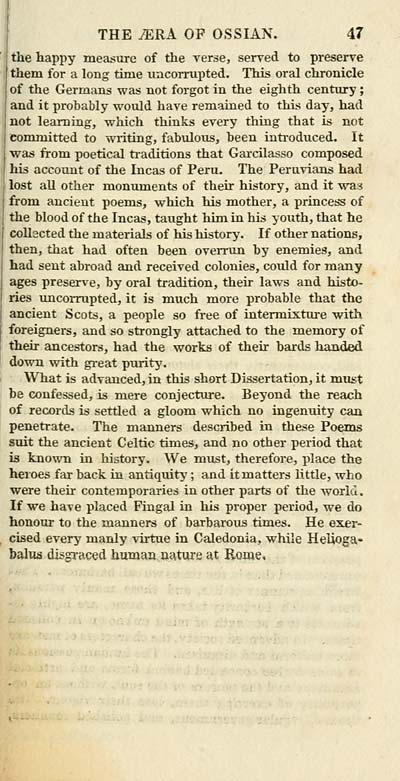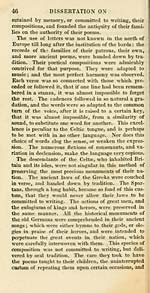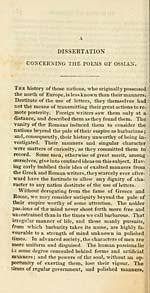Ossian Collection > Poems of Ossian
(55)
Download files
Complete book:
Individual page:
Thumbnail gallery: Grid view | List view

THE JERA OP OSSIAN. 47
the happy measure of the verse, served to preserve
i them for a long time uncorrupted. This oral chronicle
of the Germans was not forgot in the eighth century ;
and it probably would have remained to this day, had
not learning, which thinks every thing that is not
committed to -nTiting, fabulous, been inti-oduced. It
was from poetical traditions that Garcilasso composed
his account of the Incas of Peru. The Peruvians had
lost all other monuments of their history, and it was
from ancient poems, which his mother, a princess of
the blood of the Incas, taught him in his youth, that he
collscted the materials of his history. If other nations,
then, that had often been overrun by enemies, and
had sent abroad and received colonies, could for many
ages preserve, by oral tradition, their laws and histo-
ries uncorrupted, it is much more probable that the
ancient Scots, a people so free of intermixture with
foreigners, and so strongly attached to the memory of
their ancestors, had the works of their bcirds handed
down with great purity.
What is advanced, in this short Dissertation, it must
be confessed, is mere conjecture. Beyond the reach
of records is settled a gloom which no ingenuity can
penetrate. The manners described in these Poems
suit the ancient Celtic times, and no other period that
is known in history. We miist, therefore, place the
heioes far back in antiquitj' ; and it matters little, who
were their contemporaries in other parts of the world.
If we have placed Fiugal in his proper period, we do
honour to the manners of barbarous times. He exer-
cised every manly virtue in Caledonia, while Helioga-
balus disgi-aced human nature at Rome,
the happy measure of the verse, served to preserve
i them for a long time uncorrupted. This oral chronicle
of the Germans was not forgot in the eighth century ;
and it probably would have remained to this day, had
not learning, which thinks every thing that is not
committed to -nTiting, fabulous, been inti-oduced. It
was from poetical traditions that Garcilasso composed
his account of the Incas of Peru. The Peruvians had
lost all other monuments of their history, and it was
from ancient poems, which his mother, a princess of
the blood of the Incas, taught him in his youth, that he
collscted the materials of his history. If other nations,
then, that had often been overrun by enemies, and
had sent abroad and received colonies, could for many
ages preserve, by oral tradition, their laws and histo-
ries uncorrupted, it is much more probable that the
ancient Scots, a people so free of intermixture with
foreigners, and so strongly attached to the memory of
their ancestors, had the works of their bcirds handed
down with great purity.
What is advanced, in this short Dissertation, it must
be confessed, is mere conjecture. Beyond the reach
of records is settled a gloom which no ingenuity can
penetrate. The manners described in these Poems
suit the ancient Celtic times, and no other period that
is known in history. We miist, therefore, place the
heioes far back in antiquitj' ; and it matters little, who
were their contemporaries in other parts of the world.
If we have placed Fiugal in his proper period, we do
honour to the manners of barbarous times. He exer-
cised every manly virtue in Caledonia, while Helioga-
balus disgi-aced human nature at Rome,
Set display mode to: Large image | Transcription
Images and transcriptions on this page, including medium image downloads, may be used under the Creative Commons Attribution 4.0 International Licence unless otherwise stated. ![]()
| Early Gaelic Book Collections > Ossian Collection > Poems of Ossian > (55) |
|---|
| Permanent URL | https://digital.nls.uk/81238529 |
|---|
| Description | Selected books from the Ossian Collection of 327 volumes, originally assembled by J. Norman Methven of Perth. Different editions and translations of James MacPherson's epic poem 'Ossian', some with a map of the 'Kingdom of Connor'. Also secondary material relating to Ossianic poetry and the Ossian controversy. |
|---|
| Description | Selected items from five 'Special and Named Printed Collections'. Includes books in Gaelic and other Celtic languages, works about the Gaels, their languages, literature, culture and history. |
|---|

